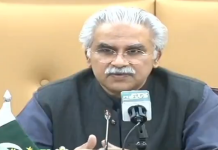Published on: August 22, 2025 10:45 AM

The Pakistan Meteorological Department announced that the rain system, which caused widespread disruption in Karachi over the past three days, is expected to move out today. Only light morning showers are likely before the current system fizzles out completely. However, officials cautioned that another monsoon system will enter Sindh between August 27 and 30, bringing another round of rainfall to Karachi and other cities in the province.
The heavy downpour earlier this week brought life to a standstill in Karachi, submerging several neighborhoods and major roads under stagnant water. Streets like Jahangir Road, Airport Road, and the route from Safora to Pehlwan Goth were waterlogged, while underpasses at Sohrab Goth and Drigh Road remained inundated. The rains also forced the closure of Korangi causeways due to the swelling Malir River, while traffic moved painfully slow across water-filled routes, stranding commuters for hours.
Flooding and related accidents claimed at least 17 lives in Karachi, with causes ranging from drowning and electrocution to road mishaps and collapsing buildings. The downpour severely disrupted the city’s infrastructure, causing power outages, suspension of mobile networks, and flight delays. Television footage showed vehicles floating in flooded streets and homes partially submerged, painting a grim picture of how vulnerable the city remains to seasonal rains.
The electricity system faced severe breakdowns, with nearly 100 feeders still shut as of Friday, leaving multiple areas without power for more than 48 hours. Residents of Gulistan-e-Jauhar, Saddar, Jubilee Market, and other neighborhoods staged protests against prolonged outages, saying they had been left without electricity and water for days. Citizens gathered outside K-Electric offices with drums to register their frustration, demanding urgent restoration of services.
Despite K-Electric claiming to have restored supply to 2,000 out of 2,100 feeders, many areas continued to report outages lasting up to 56 hours. Residents complained that the combination of waterlogged streets and extended power suspensions had deepened their misery. The situation has once again highlighted Karachi’s fragile infrastructure and limited disaster preparedness. Schools were also forced to close, with some shifting to online classes, while the provincial government avoided issuing blanket closure orders.
This year’s monsoon season has already turned deadly across Pakistan, with nearly 750 fatalities reported due to rain-related incidents. Experts warn that the country, being among the most climate-vulnerable nations, faces increasing threats from extreme weather events. The devastating floods of 2022, which submerged one-third of Pakistan and killed 1,700 people, serve as a harsh reminder of the urgent need for climate resilience and improved urban planning.









